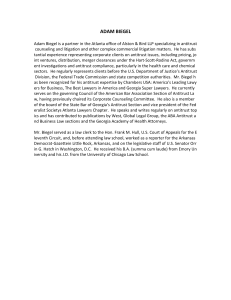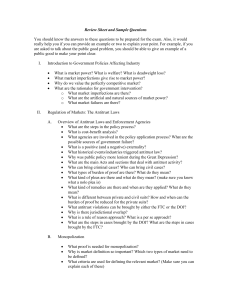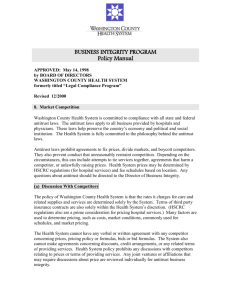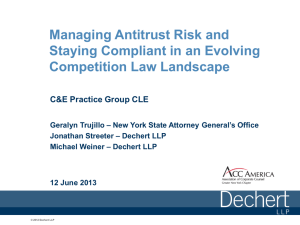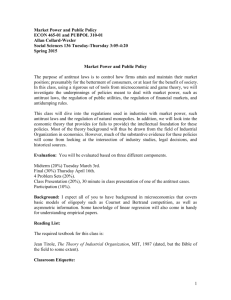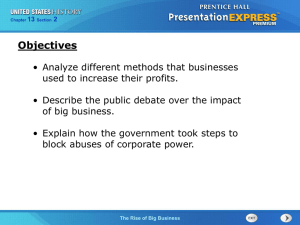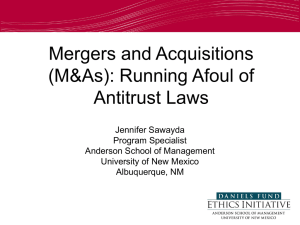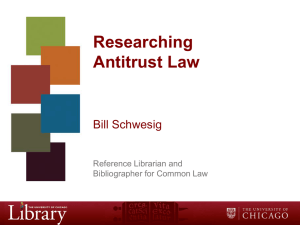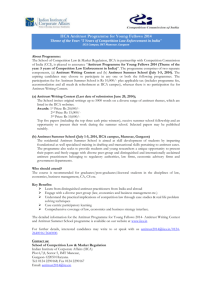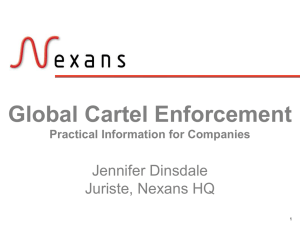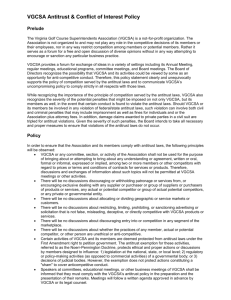Monopoly or Tragedy? Should common pool resources be exempt
advertisement
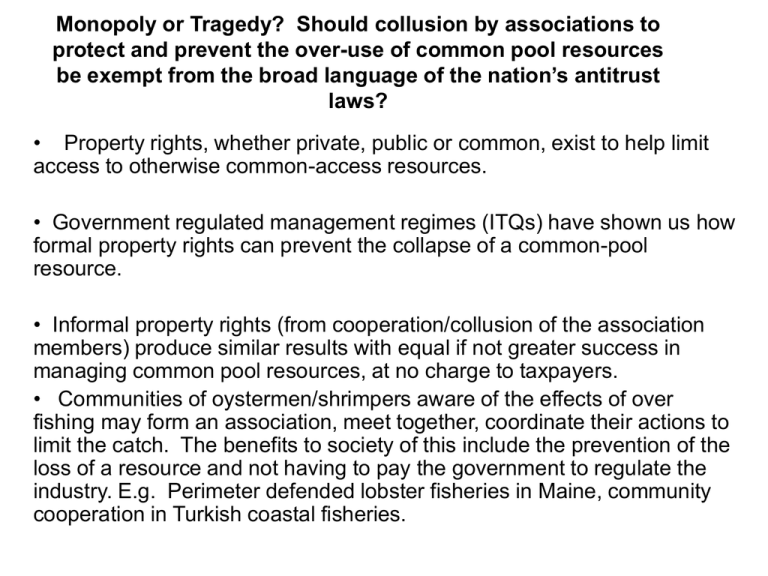
Monopoly or Tragedy? Should collusion by associations to protect and prevent the over-use of common pool resources be exempt from the broad language of the nation’s antitrust laws? • Property rights, whether private, public or common, exist to help limit access to otherwise common-access resources. • Government regulated management regimes (ITQs) have shown us how formal property rights can prevent the collapse of a common-pool resource. • Informal property rights (from cooperation/collusion of the association members) produce similar results with equal if not greater success in managing common pool resources, at no charge to taxpayers. • Communities of oystermen/shrimpers aware of the effects of over fishing may form an association, meet together, coordinate their actions to limit the catch. The benefits to society of this include the prevention of the loss of a resource and not having to pay the government to regulate the industry. E.g. Perimeter defended lobster fisheries in Maine, community cooperation in Turkish coastal fisheries. • Such coordination to restrict output raises an eyebrow from the antitrust authorities, when interpreting their actions from the language of the Sherman Act. • • • § 2 Sherman Act, 15 U.S.C. § 2 Monopolizing trade a felony; penalty Every person who shall monopolize, or attempt to monopolize, or combine or conspire with any other person or persons, to monopolize any part of the trade or commerce among the several States, or with foreign nations, shall be deemed guilty of a felony… The broad language here makes it “difficult” for authorities to determine whether the shrimpers are conspiring to monopolize, or to prevent resource degradation. Monopolizing markets yield a net reduction in social well being while redistributing wealth from consumers to producers. Preserving a common access resource yields an increase in wealth and social well being. • 1. 2. • Collusion or conspiring to restrict output is typically interpreted as a “per se” violation of the Sherman Act. • Per Se violations pertain to particular business practices viewed as having no beneficial effects. The alleged behavior is regarded as inherently harmful, and per se illegality irrefutably presumes such business conduct to be unreasonable. (If a violation is per se, proof of collusion is all that is needed to establish guilt, QED.) • Rule of Reason violations: the anticompetitive costs of a contested practice are evaluated against the business rationalizations upon which it is predicated, and a decision regarding its reasonableness is made. E.g. Vertical Mergers are usually tried by the DOJ under a rule of reason. • Collusion by members of an association attempting to prevent the collapse of a common pool resource may be scrutinized by the antitrust authorities, and a true tragedy occurs when they are viewed as per se illegal. The positive effects of the collusion are not weighed against the antitrust concerns. Fact: Price fixing is illegal per se. The collusive actions need not be explicit, a tacit agreement is enough to establish unlawful conduct. • • To show the deadweight loss to the economy, the monopoly equilibrium is compared against the purely competitive counterpart. This deadweight loss to society is the basic foundation for an antitrust inquiry. • Argument: When an association or cooperative forms (“colludes”) to protect a common-pool resource from over-use, the monopoly model should be compared against the status quo… that is, the market equilibrium incorporating the potentially greater loss to society if these informal property rights were not established and the resource, in the extreme, collapses. • Cooperative arrangements can be collusive and monopolistic (to the extent that they may be result in higher prices). Simultaneously they can also form a foundation for vital conservation. The “common sense actions” taken by ordinary people can effectively deal with the over-use problem with few costs to the consumers/tax payers (as compared to a government managed scenario). • At the very least, antitrust authorities should become more receptive to environmental reasons for organizing cooperatives to restrict access to a common-pool resource. In light of the potential abuse of these cooperatives to purposely raise prices against the gains to society of preventing resource degradation, cases brought to court should be argued as rule of reason violations, not per se. • To obtain true monopoly power, the association must control a substantial portion of the “relevant market”. The relevant market encompasses all products that are so similar that once can be used as a replacement for the other. • Whether a restriction of access and output will lead to higher prices depends on the availability of relevant substitutes. The ability for a colluding group to make a small but significant non transitory increase in price depends on the substitutability of other goods. Antitrust concern would depend on how the market is defined (narrow definition - more concern ; broad definition - little concern). • Argument: The government concern should not be so shallow as to only consider potential higher prices (i.e. per se illegal). The inquiry should be so profound as to consider whether the monopolistic deadweight loss is less than the harm caused from a collapse of the resource. • Research Proposal: Estimation of the loss to society from the collapse of a fishery could help illuminate the “rule of reason” umbrella to the legal and political arena. • A historical example • Monterey Bay fishery (1940’s): An association was formed to protect the sardine industry from over fishing. Canners and processors agreed to buy sardines at prices negotiated by the association. (violation of Sherman act). Argument of the Association: They were trying to protect the fishery from degradation. Argument of (private) Plaintiff: The Association conspired to restrain trade. • • • • • • Judge ruled in favor of Plaintiff and said, “If an exclusive monopolistic arrangement can be legally made as to fish, it can be made as to milk, as to meat, and as to other necessities of life.” Years later the unconstrained fishing access practically destroyed the fishery. Had the benefits to society of resource degradation been estimated against the deadweight loss of trade restraints (and price increases), this tragedy of the commons could have been avoided. So long as these types of cases are not tried as per se violations, the reasonableness of the collusive behavior to prevent over-use may very well outweigh the potential price increase. ITQ managed resources are also subject to antitrust scrutiny. See Individual Transferable Fishing Quotas and Antitrust Law, Ocean and Coastal Law Journal Vol 1:1 35-55. • In ITQ managed common pool resources, by anticipating antitrust concerns– for example, building quota ownership limits and processor licensing requirements into the systems, the government can design ITQ systems in which violations of antitrust laws are unlikely. • This is not possible for the informal property rights established by non-regulated associations. • Instead, associations whose collusive behavior could benefit society by preventing the collapse of a common-pool resource should be granted exemption from per se violations of the Antitrust laws. • “ Even if we accept the traditional case for rigorous antitrust enforcement, a small and probably temporary monopoly restriction could be considered a minute price to pay for maintaining a viable fish population”. Bruce Yandle Independent Review Vol 3 n1.
